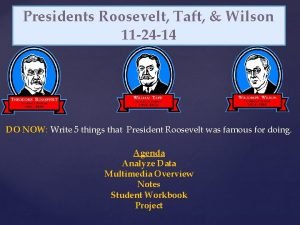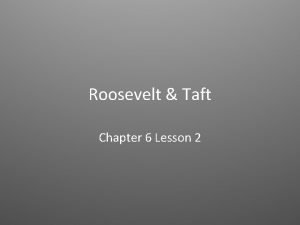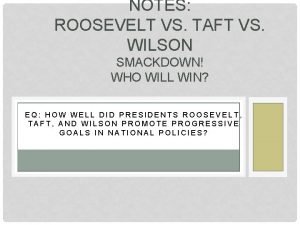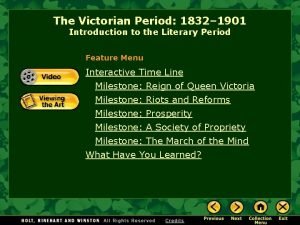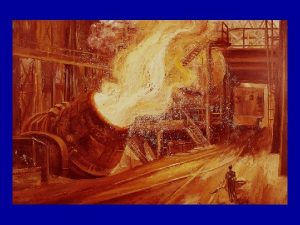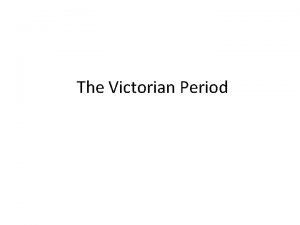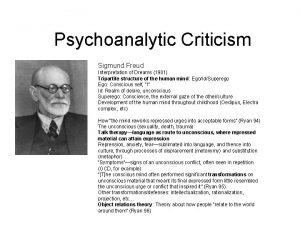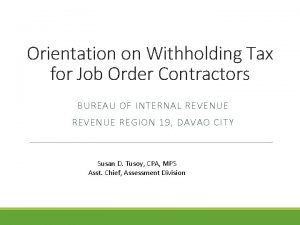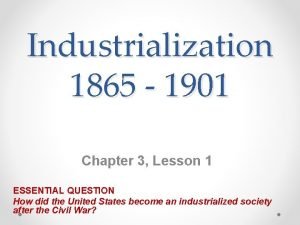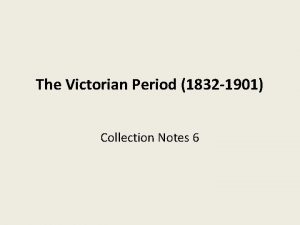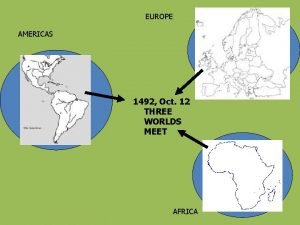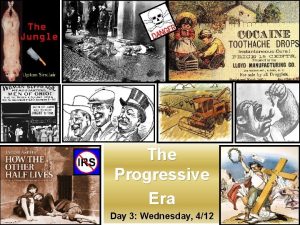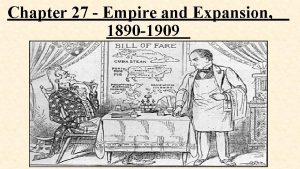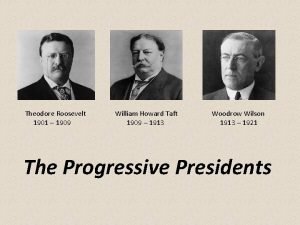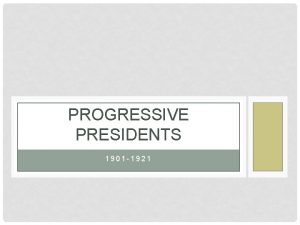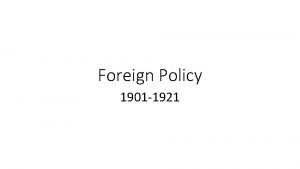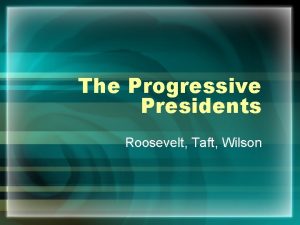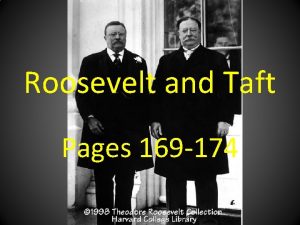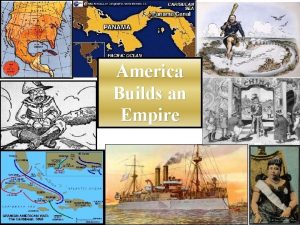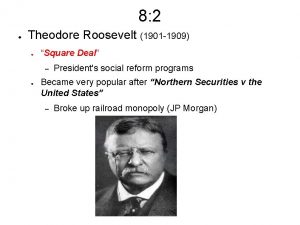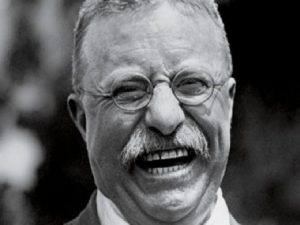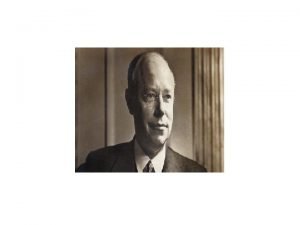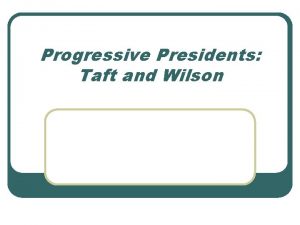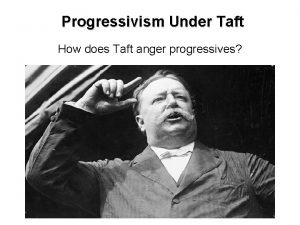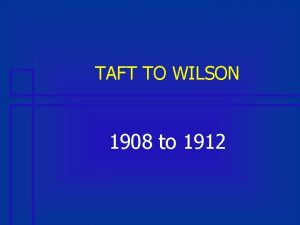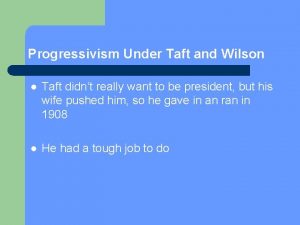T Roosevelt 1901 1909 W H Taft 1909



















- Slides: 19

T. Roosevelt (1901 – 1909) W. H. Taft (1909 – 1913) W. Wilson (1913 – 1921)

1900 Election William Mc. Kinley (Pres. ) Theodore Roosevelt (VP)

Mc. Kinley Assassinated - 1901 Pan-American Exposition in Buffalo, New York (Shot 9/6; dies 9/14)

Roosevelt’s Presidency • Works to enlarge powers of Presidency – Presidency as “bully pulpit” • “Square Deal” for the American people addressing “three Cs” – Control of corporations – Consumer protection – Conservation.

Roosevelt’s Progressive Achievements • “trust-busts” 43 companies – Northern Securities Co. vs. United States (1904) • Arbitrates negotiations between a union & management personally • Pure Food and Drug Act (1906) & Meat Inspection Act

Conservation • Roosevelt popularizes both conservation and preservation – sets aside land for government-managed use, not private sale – creates 53 wildlife reserves and five new national parks – keeps environmental issues before the public eye John Muir & President Theodore Roosevelt

National Parks

By 1908, TR has had two terms (one of his own). Should he step down? Who next?

Election of 1908 Bryan Taft

William Howard Taft


Taft’s Progressive Actions • Continues anti-trust campaign • actually more successful than TR (but does not get publicity) • Otherwise, Taft is more conservative than Roosevelt – TR decides to run again in 1912!!

1912 Election William H. Taft Teddy Roosevelt Eugene V. Debs Woodrow Wilson (Republican) (Progressive/ Bull Moose) (Socialist) (Democrat)

1912 Election All four political parties have some progressive platform planks. Major issues: Tariffs Women’s suffrage Trust-busting & workplace reforms Radical Left Socialist Party Progressive Democratic Party Centrist Republican Party Radical Right

An Actual 1912 Ballot

1912 Election Results By 1912, 100, 000 fewer people had voted for Wilson (who won) than had voted for Bryan in 1908 (when he lost). The 1912 election marked the apogee of the Socialist movement in America.

Effects of the 1912 Election Bull Moose party vanishes by 1916 Many other “Progressive” parties continue on state/local level Demonstrates the difficulties of having a major split in a political party. More states begin holding direct primaries Height of the Progressive movement Leads to the rise of Wilsonian style Progressivism Create regulatory agencies

Progressive Legislation under Wilson Major government reforms: • Federal Reserve Act (1913) – Created the Federal Reserve System to stabilize banks and currency. (“The Fed”) • Federal Trade Commission (1914) – Regulate business practices. (FTC) “Progressive” Constitutional Amendments • 16 th Amendment (1913) – Graduated Income Tax • 17 th Amendment (1913) – Direct election of senators • 18 th Amendment (1920) – Begins Prohibition • 19 th Amendment (1920) – Women’s suffrage

Domestic Legislation under Wilson Regulation of Big Business • Clayton Anti-trust Act (1914) – Regulates businesses, but contains exceptions for unions. Enforced by FTC. • Kern-Mc. Gillicuddy Act (1916) – Workers comp. for federal employees • Keating-Owen Act (1916) – Prohibited interstate sale of goods manufactured with child labor (later overturned) • Adamson Act (1916) – 8 hour day for railroad workers
 Roosevelt vs taft venn diagram
Roosevelt vs taft venn diagram Chapter 6 lesson 2
Chapter 6 lesson 2 Wilson vs roosevelt
Wilson vs roosevelt The victorian period (1832–1901)
The victorian period (1832–1901) Industrialization (1865 to 1901 worksheet answers key)
Industrialization (1865 to 1901 worksheet answers key) Fnun
Fnun Poblogaeth cymru 1971
Poblogaeth cymru 1971 The victorian age 1832 to 1901 unit test
The victorian age 1832 to 1901 unit test Numberblocks 1901
Numberblocks 1901 Abril 16 1902 kaganapan
Abril 16 1902 kaganapan Freud 1901
Freud 1901 Form 2306
Form 2306 1837-1901
1837-1901 Industrialization (1865 to 1901 worksheet answers key)
Industrialization (1865 to 1901 worksheet answers key) 1901 n. moore street
1901 n. moore street Victorian age 1832 to 1901
Victorian age 1832 to 1901 Victorian period of literature
Victorian period of literature British empire 1901
British empire 1901 Which agency name belongs on the blank line
Which agency name belongs on the blank line Chapter 27 empire and expansion
Chapter 27 empire and expansion
